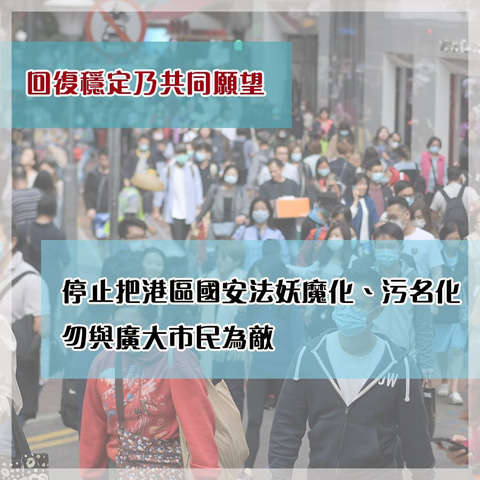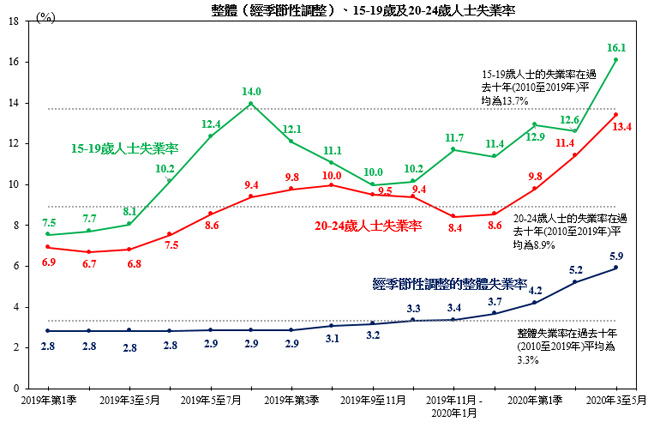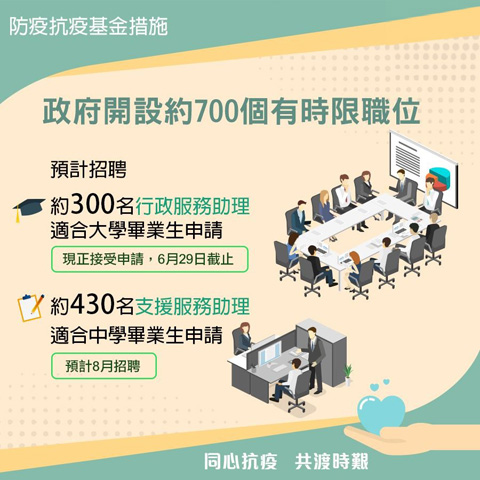From uncertainty to stability Creating jobs for the youth
21 June 2020

|

|

|
The rule of law and judicial independence are well recognised by the international community as Hong Kong’s core values and cornerstones of its success. Last Thursday, the Legislative Council passed a motion to endorse the appointment of the Honourable Mr Justice Andrew CHEUNG Kui-nung as the third Chief Justice of the Court of Final Appeal of the Hong Kong Special Administrative Region (HKSAR). I have every confidence in Mr Justice CHEUNG and the Judiciary as a whole in safeguarding the rule of law and judicial independence in Hong Kong.
The World Competitiveness Yearbook 2020 published by the International Institute for Management Development (IIMD) in Switzerland last week ranked Hong Kong first for “Legal and regulatory framework”, “Business legislation” and “Government efficiency”, and second for “Business efficiency”, reaffirming our institutional strengths over other economies across the globe. Our overall ranking, however, slipped from second to fifth, a decline attributable to the social unrest and our lacklustre economic performance last year. This exemplifies the importance of social stability and safety to our competitiveness and long-term economic development. Worrying indeed, our hard-earned robust development and economic achievements will hardly be sustained if we put up with the persistent breach of public peace by people advocating “Hong Kong Independence” and violent confrontations.
It is therefore utterly necessary and urgent for the National People’s Congress to take the decision to establish and improve the legal system and enforcement mechanisms for the HKSAR to safeguard national security at the state level in accordance with the Constitution of the People’s Republic of China and the Basic Law. The national security law will not affect Hong Kong’s high degree of autonomy under the principle of “One Country, Two Systems”. Rather, it will respect and protect the rights and freedoms which are applicable in Hong Kong under the Basic Law and relevant international covenants.
Regrettably, there are groups who openly oppose the national security law for the purpose of advancing political gains. Disregarding the Government’s repeated pronouncements that a so-called “referendum” will have no constitutional basis or legal effect, these groups wilfully held a “referendum” on strike and class boycott yesterday. They employed every possible means to the extent that civil servants and students were dragged into their schemes, and some District Councillors even opened their offices as polling stations of the “referendum”. Their attempts to take advantage of the general public, students and public money for political purposes warrant strong condemnation, and the Government will certainly not turn a blind eye to them.
Turning to the local labour market, further deterioration was recorded from March to May. The seasonally adjusted unemployment rate rose from 5.2% in February - April to 5.9% in March - May, a record high in more than 15 years. The underemployment rate likewise rose from 3.1% to 3.5%, the highest in nearly 17 years. The year-on-year declines in total employment and labour force widened further to 6.5% and 3.3% respectively, both the largest on record.
Youth unemployment was particularly serious. Among those aged 15 to 19, the unemployment rate rose to 16.1% in March - May, the highest in the past four years, representing a rise of 3.5 percentage points over February - April and a rise of 8 percentage points over the same period last year; more than 2 000 of them were unemployed. As regards those aged 20 to 24, the unemployment rate rose to 13.4%, the highest in the past decade, representing a rise of 2 percentage points over February - April and a rise of 6.6 percentage points over the same period last year; about 28 000 of them were unemployed.
Moreover, the unemployment rate of youth aged between 15 and 25 who completed their studies last year was as high as 18.2% in March - May this year, representing a rise of 10.1 percentage points as compared with the figure registered in the same period last year (8.1%) for persons of the same age group who completed their studies in 2018; more than 11 000 of them were unemployed.
Aspiring youths seek to achieve success in their career. Unfortunately, the economic downturn and job shortfall have made it more difficult for fresh graduates to secure employment and inevitably brought anxiety.
The HKSAR Government is fully cognisant of young people’s employment difficulties and will make an all-out effort to create job opportunities on all fronts. A sum of $6 billion has been earmarked under the Anti-epidemic Fund to create around 30 000 time-limited jobs in both the public and private sectors in the coming two years for people of different skill sets and academic qualifications. Many of these jobs will open up for young people and fresh graduates. Let me briefly introduce some of the schemes and programmes.
Environmental protection
The Environment Bureau’s Green Employment Scheme, which covers three categories of environmental protection work, namely “Electric Vehicles Popularisation”, “Use Less, Waste Less” and “Leave No Trace at Mountain and Sea”, have created over 500 time-limited posts. Recruitment has been open for over 100 of these posts since late May and early June.
Recreation and culture
The Leisure and Cultural Services Department (LCSD) has started recruitment for nearly 1 200 posts, including over 800 Sports Organiser Helpers, Temporary Venue Helpers and Horticultural Helpers. The first batch of over 300 newly recruited Temporary Venue Helpers have reported duty.
In addition, the LCSD will offer over 300 internship and service positions, which include Museum Research Assistants, Museum Assistants, Library Management Assistants, Venue Helpers, Arts Administrator Trainees and Stage Management Trainees, covering such areas as arts administration, venue management, programme co-ordination and event promotion.

|
Executive and clerical jobs
Preparations and recruitment are in full swing at various government bureaux and departments. The Civil Service Bureau is co-ordinating the recruitment for over 700 time-limited executive and clerical positions for these bureaux and departments to enhance efficiency and save applicants’ effort in submitting multiple applications, thereby speeding up the job creation process. The posts of Executive Service Assistant have been open for application since June 16.
Programmes to create temporary posts in non-government sectors
Besides, the Development Bureau has introduced a subsidy programme for employers to employ graduates and assistant professionals in the engineering, architectural, surveying, town planning and landscape fields. Application is open to relevant employers and has started on June 19. The Environment Bureau will also launch a subsidy programme for graduates of tertiary institutions under the Green Employment Scheme whereby subsidies will be provided for private companies to employ fresh graduates in such areas as environmental protection, ecological conservation, green energy and energy conservation, climate change and sustainable development. The Environmental Protection Department has commissioned the Hong Kong Productivity Council to implement this subsidy programme and application will be open on 26 June 2020. The Financial Services and the Treasury Bureau is also planning for a job creation programme to subsidise companies employing staff for Fintech development. It is expected that these three programmes will provide several thousands of job opportunities for a duration of 12 to 18 months.
Recruitment of over 10 000 civil servants
The Government will recruit over 10 000 civil servants in 2020-21 to replace retirees and fill new posts in about 60 bureaux and departments. Disciplined services grades and civilian grades will constitute about 30% and 70% of these posts respectively.
Internship programmes
While tertiary students are ready to enter the job market, internship programmes provide them with a key to open “the door to employment”. To this end, we have planned to increase the number of short-term internship places in the Government and the public sector to almost 5 000 in 2020-21. Meanwhile, we will also invite public organisations to offer internship placements. Some internship programmes may open only to, for example, students of specific disciplines or those from ethnic minorities.
Economic progression and full employment are fundamental to a harmonious society. That said, the gradual resumption of economic activities alone will not turn Hong Kong back to a liveable and thriving city, and it is only possible with national security and social stability maintained. Once again, I call on members of the public to support the legislation of the national security law in Hong Kong in order to preserve “One Country, Two Systems” and restore stability to the city.

